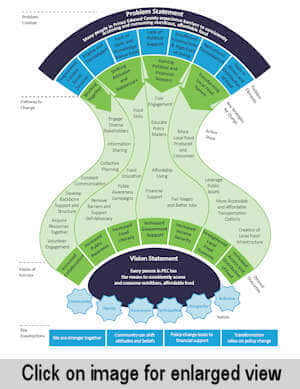Vital Signs Data
Sustainable Development Goal (SDG)
SDG 2.1: End hunger and ensure access by all people, in particular the poor and people in vulnerable situations, including infants, to safe, nutritious and sufficient food all year round.
The PEC Food Collective, comprised of 11 local organizations, continues to work toward the vision of … “A community where every person and family has nutritious, affordable food at home.”
Food Collective projects include advocating for system and policy changes that address the root causes of food insecurity.

Projects
Key initiatives include:
- 2025 Primary Objective: Provide PEC residents with access to nutritious, affordable food — directly or indirectly.
- 2025 Secondary Objective: Highlight to our community that the PEC Food Collective is working together to tackle food insecurity.
- A Community Gardens pilot project in Picton
- A long-term Food Security Collective Impact project
- The establishment of a temporary Food Depot during COVID-19 to address immediate needs.
- Food security recommendations.
Research
- 2018 Food Security Theory of Change
- 2019 Report: Using Information to Mobilize a Community: Food Security in Prince Edward County
- 2019 Food & Food Insecurity PEC Survey, The Food Collective
- 2021 Food Collective Research Audit
- 2021 Food Priority Survey of PEC residents who identify as sometimes being short on food
- 2021 The County Food Collective Plan

Vision: every person in PEC has the means to consistently access and consume nutritious, affordable food
4 Key Strategies:
- Working together (planning, communicating, acquiring & sharing resources, engaging diverse stakeholders)
- Shifting attitudes & behaviours (increasing public awareness & engagement, developing food skills & knowledge, ‘normalizing’/integrating food into other activities, supporting self-advocacy)
- Transforming the local food system (promoting local food, leveraging public assets, more accessible, affordable transportation options)
- Political & financial support (educating policymakers, financial support, better jobs & fair wages, affordable living)
Evolution of the Food Collective
Evolution of the Food Collective
Food Security was prioritized
The 2013 Vital Signs Advisory Committee prioritized three issue areas from the report: Food Security, Learning and Transportation. Working groups were formed to define priorities and projects in these three areas.
First phase of a long-term Food Security Collective Impact project
Food Systems and Community Leadership - Funding from Community Foundations of Canada and Loblaw’s Companies Limited augmented a Stage One Collective Impact grant from the Ontario Trillium Foundation (OTF) and funds from a private local donor to carry out the first phase of long-term Food Security Collective Impact project.
The Food Collective was formed
The Food Collective was formed to collaborate around the strategies in the Theory of Change.
Establishment of the temporary Food Depot during COVID-19
The Food Collective opened The County Food Depot as a short-term project to ride alongside the Food Banks during Covid-19. The supplementary, ‘no cost’ food program supplied 2,930 food hampers from April 17, 2020 and through June 25, 2021. Food Depot volunteers donated almost 3,000 hours over a 63 week period.
Research Project: Food Security in PEC
The three-month project supported the Food Collective’s annual plan and aimed to: increase food collective member engagement, increase best practice knowledge in engaging food insecure residents in food programming and income support programs, and begin long-term planning for food programs.
Relaunch of the Collective
The PEC Food Collective relaunched with the support of the The County Foundation’s Vital Impact Fund grant. This relaunch will be marked by a project — or several projects — designed to address food insecurity in a coordinated, sustainable way by the 11 members of the Collective. The County Food Collective was renamed and branded as "PEC Food Collective".
Community Gardens pilot
The Vital Signs Food Security working group partnered with Hastings-Prince Edward Public Health (HPEPH) to initiate a community garden project in Prince Edward County (Picton's Delhi Park).
The pilot project works with established programs that have been successful in making fresh local food more accessible to all in the community such as Fresh for All, Food to Share and Food Not Bombs.
Food Security Theory of Change was developed
Vision: every person in PEC has the means to consistently access and consume nutritious, affordable food.
Rural Ontario funded project
Focused on:
Building community awareness and engagement
Developing skills and knowledge
Improving access
Initiation of the PEC Fresh Market pilot
Procurement and distribution of fresh, affordable food linked to local suppliers https://www.facebook.com/pecfresh/

